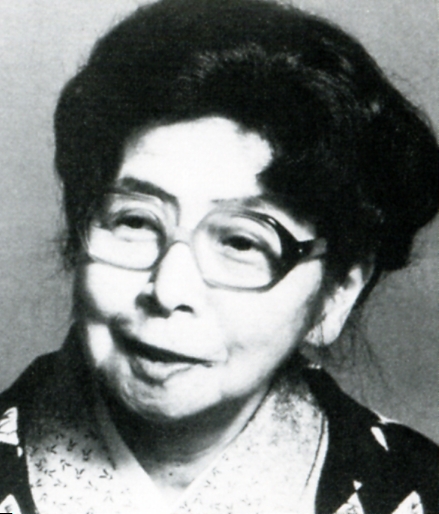- Fumiko Enchi
Infobox Writer
name = Fumiko Enchi

caption =
birthdate = birth date|1905|10|2|df=y
birthplace =Tokyo ,Japan
deathdate = death date and age|1986|11|12|1905|10|2|df=y
deathplace =Tokyo ,Japan
occupation = Writer
genre =
movement =
notableworks =
influences =Oscar Wilde ,Edgar Allan Poe ,Izumi Kyoka ,Nagai Kafu ,Ryūnosuke Akutagawa ,Jun'ichirō Tanizaki
influenced = nihongo|Fumiko Enchi|円地文子|Enchi Fumiko|extra=2 October 1905 –12 November 1986 was thepen-name of one of the most prominent women writers inShowa period Japan . Hermaiden name was Fumi Ueda.Early life
Fumiko Enchi was born in the
Asakusa district of downtownTokyo , as the daughter of distinguishedphilologist and linguistKazutoshi Ueda . Of poor health as a child, she was unable to attend classes in school on a regular basis, so her father decided to keep her at home. She was taught English, French andChinese literature through private tutors. She was also strongly influenced by her grandmother, who introduced her to the Japanese classics such asThe Tale of Genji , andKabuki andBunraku theater. At 13 her reading list included the works ofOscar Wilde ,Edgar Allan Poe , Izumi Kyoka, Nagai Kafu,Ryūnosuke Akutagawa , and especiallyJun'ichirō Tanizaki , whose sado-masochistic aestheticism particularly fascinated her.Literary career
Her literary career began in the 1920s, when she wrote several stage plays that betrayed her sympathies with the
proletarian literature movement . "Banshun Soya" (Noisy Night in Late Spring), her first work, was performed at the Tsukiji Shogekijo. She later began to write fiction but unlike her smooth debut as a playwright, she found it very hard to get her stories published.She also attended the lectures of
Kaoru Osanai , the founder of modernJapanese drama . In 1930, she married Yoshimatsu Enchi, ajournalist with whom she had a daughter. In 1945 Enchi's home and all her possessions burned during an air raid towards the end of thePacific War , and for several years immediately after the war she struggled withuterine cancer and surgical complications. She had two major operations, amastectomy in 1938 and ahysterectomy in 1946.In 1953, her novel "Himojii Tsukihi" ("Days of Hunger") was finally received favorably and the following year she won an award from the Society of Women Writers. Her novel is a violent, harrowing tale of family misfortune and physical and emotional deprivation. Her next novel was also highly praised: "Onna zaka" ("The Waiting Years", 1949-1957) won the Noma Literary Prize. It analyzes the plight of women who have no alternative but to accept the demeaning roles that the patriarchal family system had assigned to them. From the 1950s onward, she became quite successful, and wrote numerous novels and short stories exploring female
psychology and sexuality.She was awarded the
Order of Culture by the Japanese government in 1985.Fumiko Enchi died of a heart attack in 1986, and her grave is at
Yanaka Cemetery , Tokyo.Works
Novels
*"Kaze no gotoki kotoba" ("The Words like the Wind", 1939)
*"Ten no sachi, umi no sachi" ("The Treasures of Heaven and Sea", 1940)
*"Shunju" ("Spring and Autumn", 1943)
*"Onna Zaka" ("The Waiting Years", 1949-1957), English translation byJohn Bester .
*"Onna Men" ("Masks", 1958), English translation byJuliet Winters Carpenter .
*"Nama miko monogatari" ("A Tale of False Fortunes", 1965), English translation by Roger Kent Thomas.
*"Saimu" ("Growing Fog", 1976)One-Act Plays
*"Furusato" ("A Birthplace", 1926)
*"Banshu soya" ("A Noisy Night in Late Spring", 1928)Translation
*"Enchi Genji", a translation of "
The Tale of Genji " into modern Japanese.Prizes
*1969
Tanizaki Prize ---"Shu wo ubau mono; Kizu aru tsubasa; Niji to shura" (nihongo2|朱を奪うもの/傷ある翼/虹と修羅)ee also
*
Japanese literature
*List of Japanese authors External links
* [http://www.city.kamakura.kanagawa.jp/bunka/bunjinroku/enchi_e.htm Literary Figures of Kamakura ]
Wikimedia Foundation. 2010.
